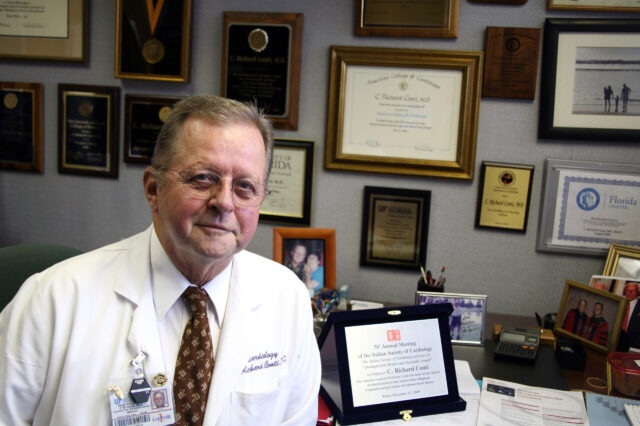UF professor receives prestigious award from Italian cardiologists

Prof. C. Richard Conti (Photo by Czerne Reid)
Prof. C. Richard Conti, M.D., has been named a Distinguished Mentor and Scientist by the Italian Society of Cardiology. In giving him the award, the society cited his "valuable research on the subject of clinical cardiology leading to better diagnosis, treatment and prevention of ischemic heart disease."
Conti traveled to Rome in December to receive the award at the 70th annual meeting of the organization.
Established in 2007, the award honors a member of the scientific cardiologic community who has made outstanding contributions to medical research and demonstrated dedication and commitment to excellence in training of young cardiologists.
"I'm very proud to have been given this award," Conti said. "What mentors do for the most part is, you befriend somebody, you serve as a role model, you open the door for people, you try and make it possible for them to do the things they want to do."
Conti is the third person to receive the Italian honor, following in the footsteps of distinguished cardiologists Valentin Fuster, M.D., Ph.D., of Mount Sinai Medical Center, and Eugene Braunwald, M.D., Sc.D., of Harvard Medical School.
Since starting at the University of Florida in the early 1970s, Conti has mentored more than 130 fellows and junior faculty, he estimates.
"Dr. Conti has been the center of the University of Florida's cardiology since 1974. He has devoted his life to education," said Jamie Conti, M.D., chief of cardiology at the UF College of Medicine and Conti's daughter. "Many of the division's faculty and fellows would tell you that they owe, in large part, their careers in academic medicine to his leadership."
Conti, a past president of the American College of Cardiology, continues his teaching and mentoring through clinical practice and as editor-in-chief of the audio journal ACCEL, which features interviews with researchers on various cardiology topics. He has also served as chairman of the American College of Cardiology Extramural Program Committee. As chairman of the Self-Study Educational Programs Committee, he led the development of the American College of Cardiology Self-Assessment Program.
Editor of the journal Clinical Cardiology, Conti has had major research success in the area of ischemic heart disease over the years, publishing more than 700 scientific papers, book chapters and abstracts as well as authoring two books and editing six.
In 1975 he conducted the first clinical trial of unstable angina, funded by the National Heart, Lung and Blood Institute. He also was first to describe a way to provoke coronary artery spasm with the drug ergonovine to aid diagnosis of heart disease. In addition, he led an NHLBI-funded multicenter, multinational study of silent myocardial ischemia, in which people have heart disease but no symptoms.
"His work has changed the way we read and think about coronary artery disease," said Raffaele Bugiardini, M.D., chair of the Italian Society of Cardiology 70th Annual Meeting and member of the award selection committee, who describes Conti's work as "exemplary."
On accepting his award, Conti delivered the conference's opening lecture, titled "The continuing value of catheter-based coronary angiography."
Coronary angiography is the basis for a host of widely used procedures such as angioplasty, computed tomography angiography, nuclear stress tests and echocardiogram studies.
"He clearly has demonstrated that properly done cardiac catheterization with contrast angiography must still be a one-stop shop for diagnostic imaging and therapy of the cardiovascular system, as the radiation dose is acceptable," Bugiardini said.
Conti first started doing coronary angiography in 1965 when he trained as a fellow.
He retired from UF three years ago, but came back to work as an attending physician 26 weeks a year. "I love doing it," he said. "That's my favorite thing to do."